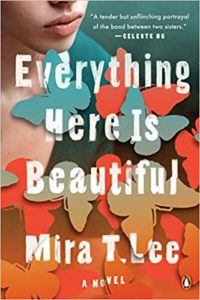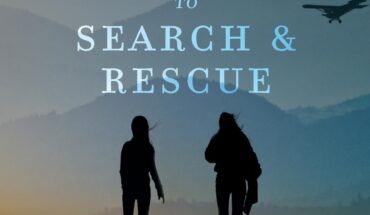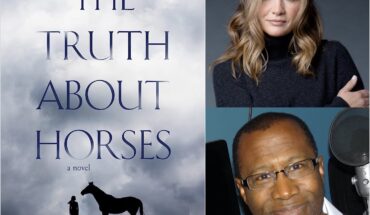 A quick glance at the praise on Mira T. Lee’s website tells the story. Her debut novel, Everything Here Is Beautiful, was deemed a top fiction pick for 2018 by Amazon, Goodreads, Reader’s Digest, Real Simple, and O, The Oprah Magazine. Booksellers from coast to coast and reviewers from publications like The Seattle Times, The Wall Street Journal, The Boston Globe, and Marie Claire found Everything Here Is Beautiful “profoundly relatable,” “raw and acutely human,” and written with “supreme authorial confidence.” Her fellow writers called the book “stunning and unforgettable” (Ruth Ozeki), “tender but unflinching” (Celeste Ng), and her depiction of mental illness “nuanced, compassionate…” (Mark Lukach).
A quick glance at the praise on Mira T. Lee’s website tells the story. Her debut novel, Everything Here Is Beautiful, was deemed a top fiction pick for 2018 by Amazon, Goodreads, Reader’s Digest, Real Simple, and O, The Oprah Magazine. Booksellers from coast to coast and reviewers from publications like The Seattle Times, The Wall Street Journal, The Boston Globe, and Marie Claire found Everything Here Is Beautiful “profoundly relatable,” “raw and acutely human,” and written with “supreme authorial confidence.” Her fellow writers called the book “stunning and unforgettable” (Ruth Ozeki), “tender but unflinching” (Celeste Ng), and her depiction of mental illness “nuanced, compassionate…” (Mark Lukach).
Everything Here Is Beautiful is about two sisters, Miranda—older, wiser, under control and in control—and Lucia—impetuous, vibrant, sometimes volatile. When their mother dies and Lucia starts showing signs of mental illness, Miranda takes it upon herself to try to help Lucia, whose illness and natural impulsiveness make that increasingly difficult. Miranda struggles to keep her own life stable as Lucia’s becomes increasingly chaotic. In a story that spans continents and deals with a range of issues from family loyalty to mental illness to immigration, Everything Here Is Beautiful was one of my favorite books of 2018. I so admired Lee’s deft control of multiple points of view and her mastery of voice, including Lucia’s Israeli husband Yonah and Manny, her Ecuadorian lover and father of her child. We’re so thrilled to welcome Mira—who is also a Grubbie—to Dead Darlings!
It’s been about a year since the publication of EVERYTHING HERE IS BEAUTIFUL (EHIB) and the paperback hits shelves this week. I know you’ve done so many interviews and talked so much about this gorgeous novel over the year. Since Dead Darlings is a blog for writers dealing with the often unpredictable world of publishing, what are maybe three takeaways you have a year after your novel debuted?
A former mentor once told me that the three words every author must come to terms with are: Why. Not. Me. And I’d agree, that pretty much sums it up. Publishing a book is a strange experience – on one hand, it’s a dream come true, but once you’re there, you also find that disappointments are everywhere. If you look. It took me a long time to stop looking, to stop obsessing about social media, Googling other people’s books to see how many Amazon ratings they had (compared to mine), worrying about my GoodReads ratings, etc. When I eased up on all of that stuff, I became a lot happier. I wrote the book I wanted to write, and it’s out in the world. That’s a big WOW. My advice to new authors: hang on to that.
Try everything once. My most unexpected highlight of the year was an impromptu visit to a Boston public charter high school. I’d had certain notions about who my novel might appeal to: people with loved ones with mental illness, women in book clubs, parents of young children, Asian-Americans. I never imagined that I’d walk into a room of 70 high school kids, mostly African-American, and overhear them arguing passionately about what my characters should or shouldn’t have done—which guy was the better boyfriend, which sister was more at fault—as if my characters were their friends. That was the biggest thrill.
But, also: be comfortable saying no. At the end of the day, it’s probably not going to affect your sales. But it may preserve your own sense of well-being.
EHIB is told from different narrative perspectives. I’m wondering if you felt aligned with certain characters initially and how your allegiances might have shifted while you were completing the novel, over the course of editing and revising for your publisher, and now a year later.
From the exterior, I’m probably closest to Miranda. I’m usually “the responsible one,” and I understand how hard it can be to live in that role. But I’ve also developed a strong allegiance to Manny, which has only grown since the publication of the book because he has gotten so much less attention than the other characters. In many ways, I see him as the most heroic—while Miranda worries about her sister from far away, he’s the one in the trenches, living with the unpredictability of Lucia’s illness while also trying to raise a young child. My empathy for Lucia also grew as I worked on her chapters. I began to understand how the illness took away her sense of identity not only when she was “sick,” but also when she was “well.”
One of the most striking things about EHIB for me, and what made it one of my very favorite reads of 2018, was how well you captured the voices of your various narrators. I loved and admired Manny and was so taken with his chapters, which were so compelling. As a female and as a writer of color, did you get asked that very current question—who gets to write the story? Has your feeling about that changed since publication?
Surprisingly, I haven’t really gotten that question. I think maybe that’s because this is not a story about Manny being an Ecuadorian male, it’s about Manny in the difficult role of Lucia’s partner. For me, his cultural background has always been incidental to his main role in the story. I didn’t want to leave it out, either, because it felt true to me, and to the people who have inhabited my own world. I wanted people to realize that these kinds of messy situations with mental illness happen to everyone, not only upper-middle class white people who are living smooth, “predictable” lives. Manny was who he was in the novel well before there was much conversation about “who gets to write what” and honestly, today, I think I’d be a lot more hesitant. But I’m glad I didn’t shy away from having characters who look different from me—that’s America, and that’s our world today.
I have a friend who is dealing with complicated family mental health issues. Her first reaction when the ground shifts beneath her feet is what she calls “reflexive optimism.” I think that about Yonah, in his continued belief in beauty. It reminds me, too, of the poem Good Bones by Maggie Smith—“We could make this place beautiful.” You also maintained a daily list of beautiful things for a while. Do you think of yourself as reflexively optimistic?
Well, I’m glad you think I could pass for an optimist! But no, I would not consider myself reflexively optimistic. If anything, I’d lean towards the opposite. But having gone through some pretty tough times with my own family, I do think of myself as reflexively appreciative. I don’t tend to say, “Oh, let’s find the bright side” when things are awful. But I do say, “Hey, if no one is actively sick/in crisis or dying, then I should be thankful!”
The immigrant experience figures prominently in EHIB. In 2018, immigration and borders were obviously a big part of the political discussion. I know you couldn’t have predicted that as you were writing. How did your conversations about immigration as it relates to EHIB shift over the course of the year?
Immigration, much like the backgrounds of my characters, is part of EHIB, but I also see it as incidental to the main story. My world has always been full of immigrants, so it was a simple matter of “writing what you know.” I didn’t intend to make any kind of statement about immigration, but I did want to show that immigrants end up in tricky situations of all kinds, including those involving mental illness.
I really struggled with whether asking this question was obnoxious! But I have to know! The epilogue. Did you always plan that or was it part of the revision process? I ask because I would have been happy to sit with that final moving chapter before it.
The epilogue was always there, but the original ending was much more abrupt, it basically ended with the scene of Lucia in the snow, with none of the follow-up scenes. My editor thought we needed to draw it out, and I agreed. We both thought the epilogue should be there, because it allows Miranda to reflect on what happened, which also helps steer the reader to some of the unanswered questions I wanted them to ponder. When you think about it, writing is really an exercise in manipulation!
Can you talk a little about your writing process? Are you an in-the-chair everyday writer? A 5am writer? Do you have to hear the “muse” to writer?
My kids were very young when I wrote the first drafts of this book, so I was an after-8pm writer—after I put them to bed. I have never been an everyday writer, though I’m trying to change that. But it really depends on where I am in the process. Around drafts 3 or 4, I became an anywhere/anytime writer—car, shower, walk, dinner—my mind was always in the world of my characters. As a writer, that’s the best, though I imagine it’s less pleasant for my husband!
How do you balance promotion and the business side of publishing with the creative process and setting aside time for writing?
I’ve found it incredibly tough to switch my brain from one side to the other. The past year has flown by, but somehow it feels like I’ve accomplished nothing! That’s hard, because I’m the kind of person who likes tangible achievements, to be able to see the results of my work (literally—I’m also a graphic designer). I’d advise writers to take it easy on themselves, and to understand how much the promotion stuff can take out of you, especially if you’re an introvert.
Finally, on the lighter side, what are you reading now and what are you looking forward to reading in 2019?
I have a terrible habit of reading six books at once and not finishing half of them. Often they are “research” for something I think I might be interested in, and then I realize, hmm, maybe not. Right now, I’m rereading Richard Yates’ Revolutionary Road, partway through Joan Didion’s Year of Magical Thinking, and just started Elena Ferrante’s The Days of Abandonment. I have so many of 2018’s “must-reads” on my shelf that I still haven’t touched. But I’m in the intake phase for my next project, so I’m trying to focus on books that will give me inspiration. I’ll let you know if it works!
About Mira T. Lee: Mira T. Lee’s debut novel, Everything Here Is Beautiful, was selected as a Best Fiction title of 2018 by the American Booksellers Association, Amazon, and O, The Oprah Magazine, among others, and longlisted for the 2018 Goodreads Choice Awards for both Best Debut Author and Best Fiction. Her short stories have appeared in journals such as the Southern Review, the Missouri Review, and Harvard Review, and have twice received special mention for the Pushcart Prize. She lives in Cambridge, MA.




1 comment